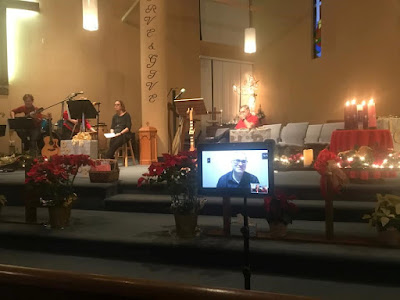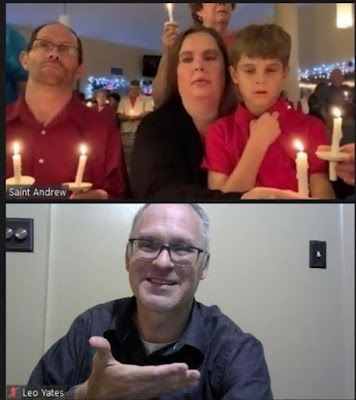A Wave of the Future – Video Remote Interpreting for Churches
By Rev. Leo Yates, Jr.
The incorporation of sign language interpreters into worship services is more than a novelty, but it still isn't their norm for some congregations. St. Andrew United Methodist Church in Titusville, FL, has a handful of Deaf and hard-of-hearing members who utilize interpreting services so everyone can worship. Lifelong members, the Deters family consists of Billy, who is Deaf, his Deaf wife, Mary Ann, and their son, David. For the Deters family, having a sign language interpreter is essential.
When an in-person sign language interpreter could not be located for the Christmas Eve service, the Deterses consulted with a member of the Deaf and Hard-of-Hearing Ministries Committee, a committee of Global Ministries, for suggestions. This conversation led to the idea of using a video remote interpreter in place of a live in-person interpreter. As a result, St. Andrew arranged to secure a video remote interpreter for the congregation (interpreters are for both Deaf and hearing persons).
By the time the 2020 Christmas Eve service was being planned, St. Andrew, like most churches, was already offering hybrid services, a combination of in-person and livestream services. For the 2020 service, the Deters family had their tablet (iPad) with them as they sat in the pew. They logged into a Zoom session with a video remote interpreter from Maryland, who was also on a tablet, while running the St. Andrew livestream service on his laptop. This concept of video remote interpreting isn't new per se, as many businesses, hospitals, and even some court systems utilize this service. But for St. Andrew, this provided a means for the entire Deters family to still worship together for one of the holiest services of the year.
For these occasions, St. Andrew had difficulty acquiring interpreters, in part, due to the Covid pandemic, but also due to there not being a large pool of interpreters in the Titusville area. It is often cost-prohibitive for the church to use a sign language interpreting agency (a referral agency) as the cost of the interpreter also includes revenue for the agency. However, this cost is not out of the question for some churches for high holy days, such as Easter and Christmas Eve.
Will video remote interpreting be the wave of the future? It is already here and is now finding its way into the church. Depending on how one looks at this, it could be seen as another silver lining of the pandemic – churches offering hybrid services to meet congregational needs and now using video remote interpreting. It is important, however, to consult with direct users to ensure this will meet their needs instead of deciding for Deaf and hard-of-hearing persons. Technology has not yet caught up for Deafblind persons unless the Deafblind person strictly has low vision instead of being fully blind.
* Leo Yates Jr is Accessibility and Inclusion Coordinator for the Baltimore-Washington Conference. To learn more or to consider having video remote interpreting at your church, contact him at leoyjr@gmail.com.



No comments:
Post a Comment